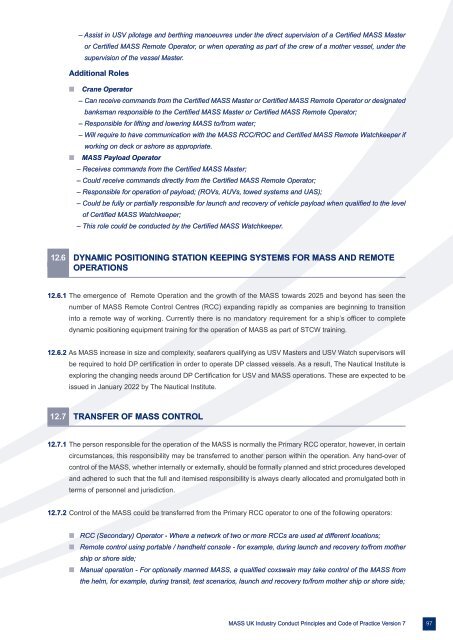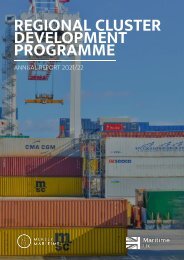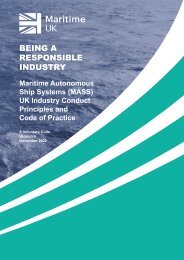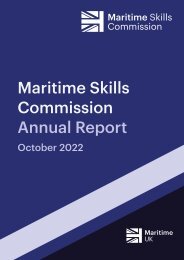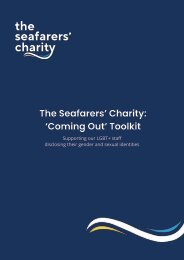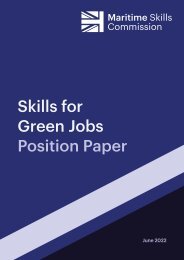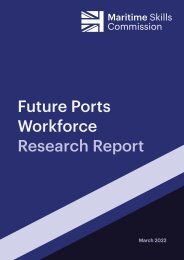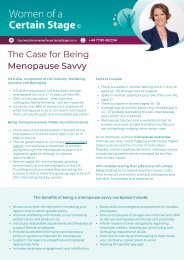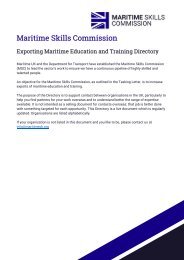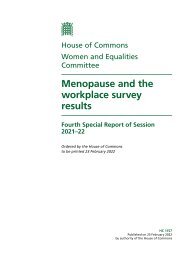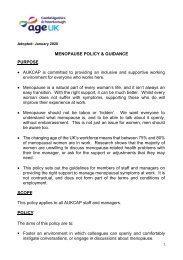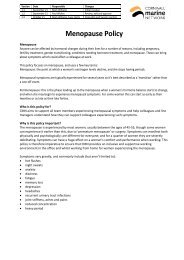COP_2023_V7_pages
You also want an ePaper? Increase the reach of your titles
YUMPU automatically turns print PDFs into web optimized ePapers that Google loves.
– Assist in USV pilotage and berthing manoeuvres under the direct supervision of a Certified MASS Master<br />
or Certified MASS Remote Operator, or when operating as part of the crew of a mother vessel, under the<br />
supervision of the vessel Master.<br />
Additional Roles<br />
n Crane Operator<br />
– Can receive commands from the Certified MASS Master or Certified MASS Remote Operator or designated<br />
banksman responsible to the Certified MASS Master or Certified MASS Remote Operator;<br />
– Responsible for lifting and lowering MASS to/from water;<br />
– Will require to have communication with the MASS RCC/ROC and Certified MASS Remote Watchkeeper if<br />
working on deck or ashore as appropriate.<br />
n MASS Payload Operator<br />
– Receives commands from the Certified MASS Master;<br />
– Could receive commands directly from the Certified MASS Remote Operator;<br />
– Responsible for operation of payload; (ROVs, AUVs, towed systems and UAS);<br />
– Could be fully or partially responsible for launch and recovery of vehicle payload when qualified to the level<br />
of Certified MASS Watchkeeper;<br />
– This role could be conducted by the Certified MASS Watchkeeper.<br />
12.6 DYNAMIC POSITIONING STATION KEEPING SYSTEMS FOR MASS AND REMOTE<br />
OPERATIONS<br />
12.6.1 The emergence of Remote Operation and the growth of the MASS towards 2025 and beyond has seen the<br />
number of MASS Remote Control Centres (RCC) expanding rapidly as companies are beginning to transition<br />
into a remote way of working. Currently there is no mandatory requirement for a ship’s officer to complete<br />
dynamic positioning equipment training for the operation of MASS as part of STCW training.<br />
12.6.2 As MASS increase in size and complexity, seafarers qualifying as USV Masters and USV Watch supervisors will<br />
be required to hold DP certification in order to operate DP classed vessels. As a result, The Nautical Institute is<br />
exploring the changing needs around DP Certification for USV and MASS operations. These are expected to be<br />
issued in January 2022 by The Nautical Institute.<br />
12.7 TRANSFER OF MASS CONTROL<br />
12.7.1 The person responsible for the operation of the MASS is normally the Primary RCC operator, however, in certain<br />
circumstances, this responsibility may be transferred to another person within the operation. Any hand-over of<br />
control of the MASS, whether internally or externally, should be formally planned and strict procedures developed<br />
and adhered to such that the full and itemised responsibility is always clearly allocated and promulgated both in<br />
terms of personnel and jurisdiction.<br />
12.7.2 Control of the MASS could be transferred from the Primary RCC operator to one of the following operators:<br />
n RCC (Secondary) Operator - Where a network of two or more RCCs are used at different locations;<br />
n Remote control using portable / handheld console - for example, during launch and recovery to/from mother<br />
ship or shore side;<br />
n Manual operation - For optionally manned MASS, a qualified coxswain may take control of the MASS from<br />
the helm, for example, during transit, test scenarios, launch and recovery to/from mother ship or shore side;<br />
MASS UK Industry Conduct Principles and Code of Practice Version 7 97


